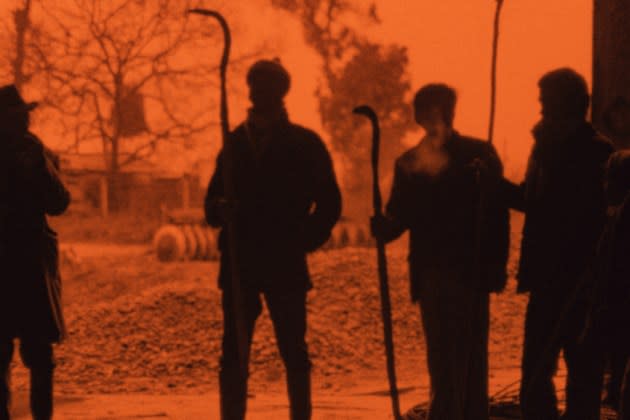Raul Ruiz’s Rescued ‘Socialist Realism’ World Premieres in San Sebastian 50 Years After He Shelved It
- Oops!Something went wrong.Please try again later.
- Oops!Something went wrong.Please try again later.
- Oops!Something went wrong.Please try again later.

A sardonic view of Popular Unity, the left-wing alliance once led by the Chilean socialist president Salvador Allende, Raul Ruiz’s docu-fiction hybrid, “Socialist Realism,” world premiered at the San Sebastian Film Festival on Sept 23, 50 years after the prolific filmmaker was forced to abandon it.
It finally unspools after his widow, filmmaker-editor Valeria Sarmiento, with the backing of actress-helmer Chamila Rodríguez’s Poetastros production company, rescued and reconstructed the film.
More from Variety
Both Sarmiento and Rodríguez are in San Sebastian to present the pic.
Ruiz, who died in 2011, was forced to flee the brutal 1973 coup d’état in his country and was never able to finish editing the hybrid feature.
What some pundits hailed as one of the filmmaker’s “most ambitious and political works” is made up of a series of short stories where two contrasting worlds collide, that of the workers and the bourgeois intellectual supporters of the Popular Unity coalition. Its trailer shows the growing clashes within the alliance.
“At a certain moment,” Ruiz once described, “these characters intersect in an apparent friendship that ends in action-packed scenes with crossing bullets and songs shouted at the top of their lungs, thus producing a satirical reading of the time.”
“The movie contains a valuable record of the turbulent political climate that Chile experienced during the Popular Unity period, the government led by Salvador Allende, the first socialist president to come to power through a democratic election in 1970,” said Rodriguez, who also produced two earlier films of Ruiz’s (“La telenovela errante” and “El tango del viudo y su espejo deformante”), with “Social Realism” completing the trilogy.
“Much of the film material was in poor condition, and the violence of its timeline is evident in every scratched and damaged frame,” she noted, adding: “This required a meticulous effort to rescue and repatriate the material. High dynamic range scanning was necessary, which was carried out in laboratories in New York City and at the Royal Cinematek in Belgium.”
With the support of Cineric in Portugal, the selected material was restored under the direction of Poetastros co-founder/co-director Galut Alarcón who oversaw the entire process, said Rodriguez, who added that once the final sequences were assembled, the post-production process for both image and sound was completed in Chile under the direction of Sarmiento.
Sarmiento had the support of Duke University, Royal Film Archive of Belgium-Cinematek, and Cineric Portugal for this endeavor.
What makes the documentary even more poignant is that its director of photography, Jorge Müller, who was detained and vanished after the coup, remains missing to this day.
“With these elements, it becomes possible to reflect on the commemoration of the 50th anniversary of the coup. Its visionary clarity now appears as a prophecy of our present-day history,” said Rodriguez.
Best of Variety
Sign up for Variety’s Newsletter. For the latest news, follow us on Facebook, Twitter, and Instagram.
